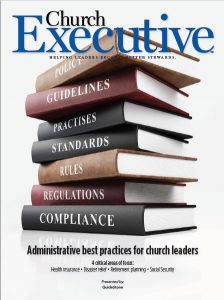
By Scott Charbonneau
Effective ministry leaders are committed to investing in their staff. You nurture their faith and provide the tools they need to carry out the mission.
However, caring for your staff runs deeper than ministry basics. You should also consider providing benefits like group health insurance to support them and their families from a physical standpoint.
Recently, a ministry leader we were working with told us he viewed choosing the right health coverage as an essential part of caring for and protecting his employees’ calling, while confessing that it was one of the most confusing choices he faced.
With a century of serving churches and ministries, including the past five decades in the health coverage industry, we have learned the secret to choosing a health plan is to focus on the needs of your ministry team before you start shopping for a plan. That’s why our insurance representatives encourage ministry leaders to answer these five questions to determine which group health plan is best for them:
#1: How much coverage do we need?
A High Deductible Health Plan (HDHP), offering lower monthly premiums in exchange for the employee shouldering a greater portion of the cost of care, can be a good choice for a group of young, healthy adults. Families with children or individuals with complex health issues might prefer to pay higher monthly premiums in exchange for the lower cost-sharing found in a PPO.

#2: Will we be in the right network?
Because staying in-network is the best way to access quality care at the lowest price, choosing a plan with a large provider network makes it easier for employees to get the care they need. A geographically constrained network might work for employees all based in one area. However, if your employees are more scattered, or if they are providing coverage for their college-aged children, a plan with a nationwide network of discounted carriers is a better option.
#3: How will we manage prescriptions?
Plans that encourage the use of generic drugs and mail-order delivery options for maintenance drugs can result in significant savings for both the participant and your ministry. You should also look for a plan that offers access to brick-and-mortar pharmacies in your community.
#4: What are the extras?
Look for incentives that help lower the cost of care. Programs such as telemedicine, opportunities to earn cash rewards for using lower-cost providers, and coverage for individuals traveling overseas are some possibilities.
#5: What else can we do to support our plan?
Consider going the extra mile to provide your employees the tools they need to maximize their benefits. Pair your HDHP with a Health Savings Account so employees can set aside funds to pay their deductible. Offer a Flexible Spending Account so employees in your PPO can set aside pretax dollars to cover out-of-pocket costs.
Answering these five questions when considering your plan options can help you choose the best medical coverage for your employees while being a good steward of your resources.
Scott Charbonneau is managing director of Insurance Plans at GuideStone, where he has served churches and ministries since 2002. Charbonneau and his team of experienced insurance professionals are dedicated to meeting employee benefit needs by providing ministries with quality, affordable health coverage that reflects their biblical values. Visit GuideStoneInsurance.org/Employers to learn how GuideStone can serve your ministry.


